Google Ranking Dropped Dramatically? Here's What to Do
Oct 28, 2024
Written by Casey Bjorkdahl

Casey Bjorkdahl is one of the pioneering thought leaders in the SEO community. In 2010, Casey co-founded Vazoola after working for a Digital Marketing Agency for five years in New York City. Vazoola is now one of the fastest growing and most widely recognized SEO marketing firms in the country.
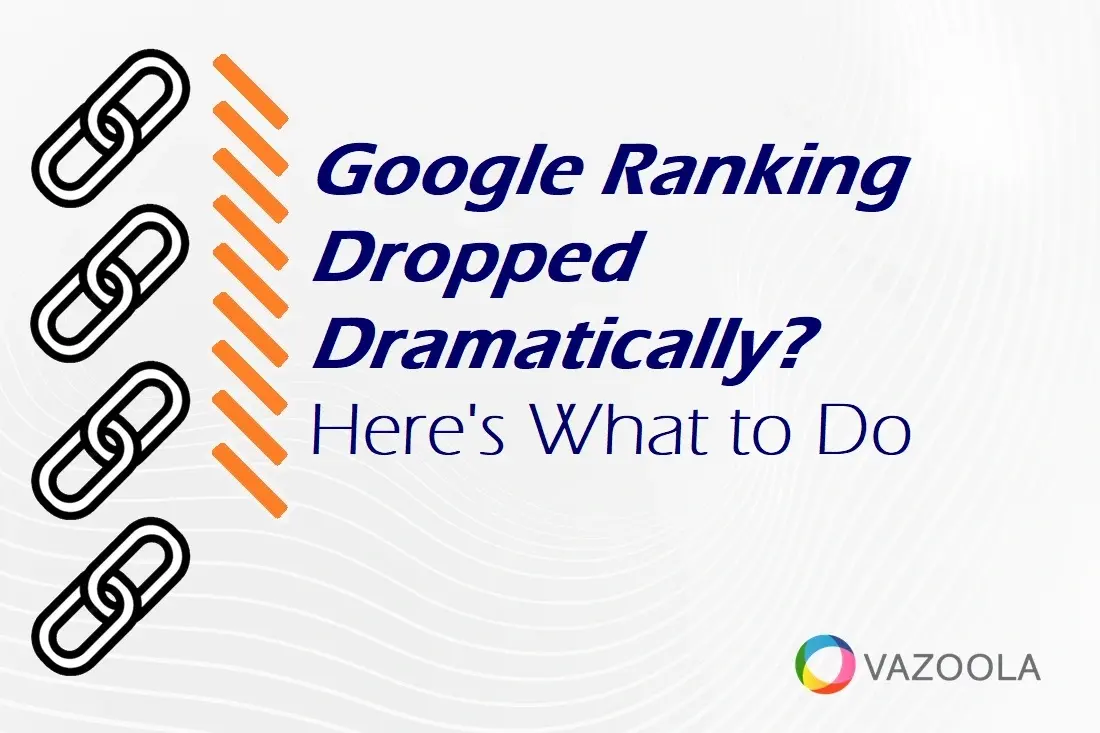
Over the past couple of years, countless sites that had once been thriving saw their Google SERPs suddenly tank. The site owners simply woke up one day to find all their SEO efforts had been for naught.
Did this happen to you? How do you recover?
While the drops in rankings might have seemed random and even malicious, Google had its reasons.
The search giant announces regular core algorithm updates, which impact anyone involved in SEO. As expected, recent updates led to noticeable changes in search rankings. To rebound from ranking drops, website operators have to understand the changes and Google’s goal when making them.
No matter how much your Google rankings dropped, just know you aren’t alone. SEO Roundtable conducted a survey following the August 2024 core update, and it asked site owners how they were impacted. According to more than 3,500 respondents:
-
44% said rankings/traffic are down.
-
27% said rankings/traffic are up.
-
29% said no change.
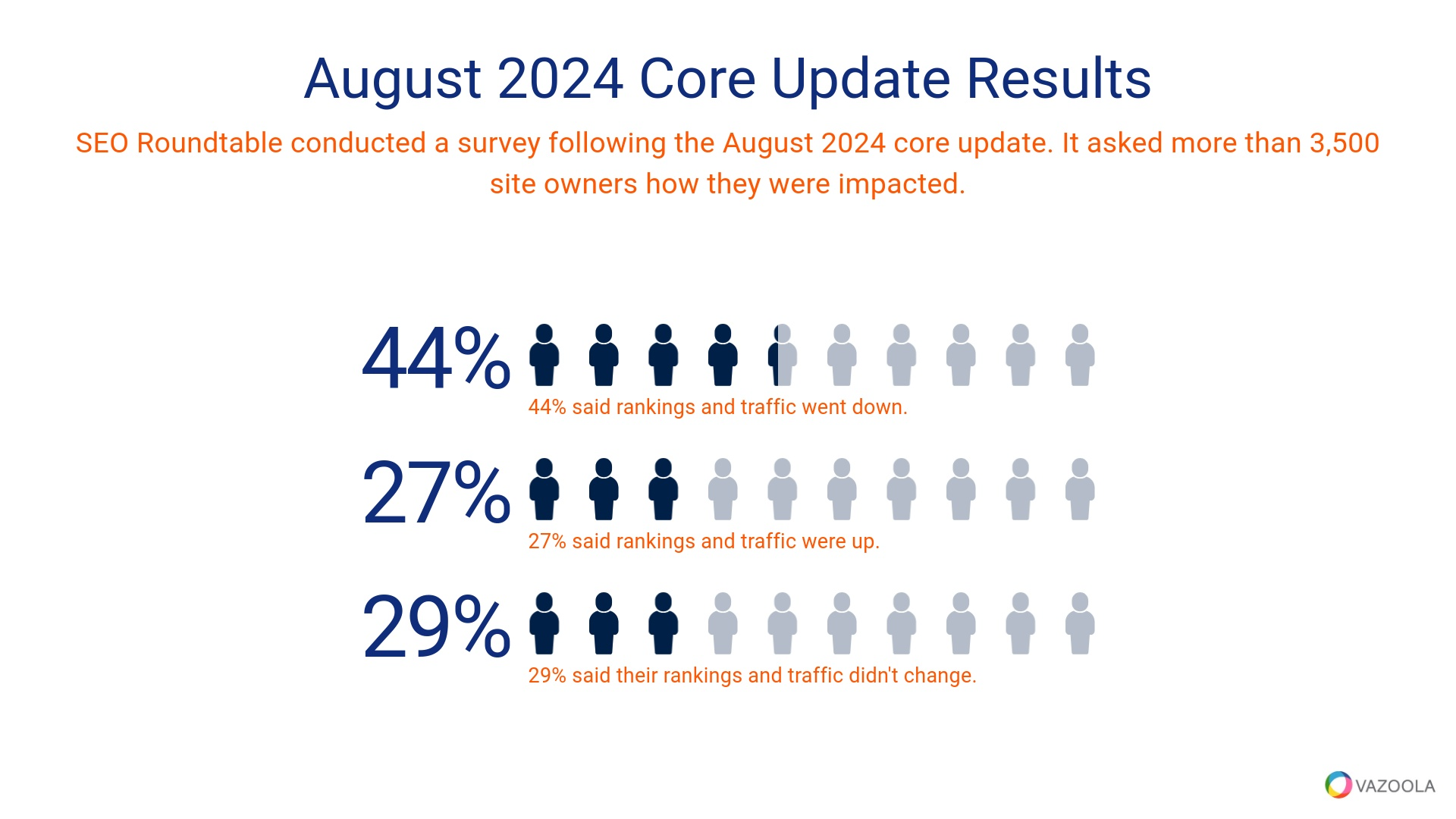
What sort of algorithmic changes happen in Google’s core updates? The most recent, for example, included:
-
Content Quality: The update places emphasis on content that offers genuine value, including relevance, trustworthiness, and insightfulness.
-
Support for Creators: Google elevates sites that produce useful, original content. It favors content from smaller, independent creators.
-
Low-value Content Penalties: Google penalizes content created solely to rank well.
No matter how negatively a core update impacts your site’s search rankings, you can recover. Keep reading for the full scoop.
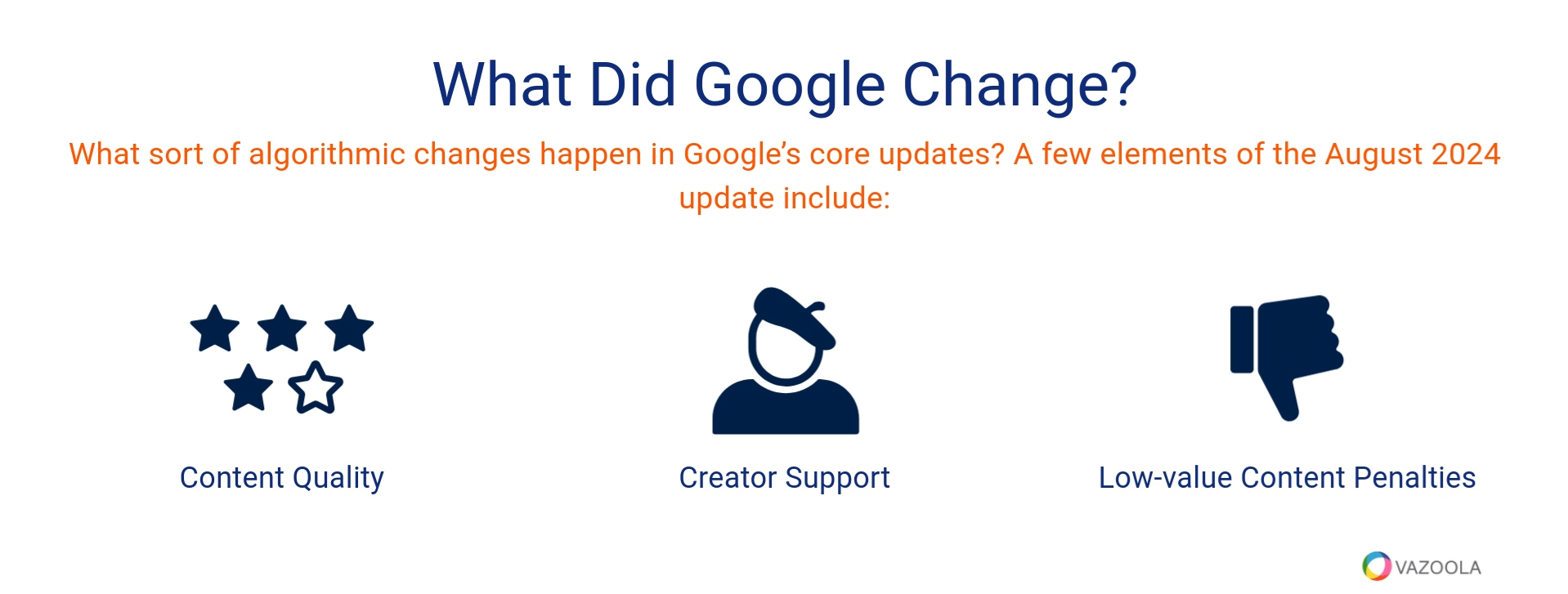
Google Drop: Key Takeaways
-
When Google search rankings drop, first assess if the change was gradual or sudden to determine whether it’s a technical issue or an algorithm update.
-
Core algorithm updates and SERP adjustments by Google can directly impact your rankings, so stay informed through Google Search Console and similar tools.
-
Conducting a technical SEO audit and addressing issues like slow load times, broken links, or thin content can help recover rankings lost due to on-page factors.
-
Optimizing metadata, such as title tags, meta descriptions, and headers, can significantly improve site visibility in search results.
-
Relying solely on AI-generated content without refining for quality can harm rankings if the content lacks originality or relevance.
-
Competitor actions, like improved content or link-building strategies, can push your site lower in rankings, making it important to regularly monitor their SEO tactics.
-
Monitoring your backlink profile and earning reputable links from authoritative sites can prevent ranking drops caused by poor-quality or lost backlinks.
Table of Contents
So Your Google SERPs Dropped, What Now?
Why is my Google rank dropping, you might wonder. Why did my website disappear from Google? What do you do after Google dropped your SERPs position?
When your Google rankings drop, first determine whether the decline was gradual or sudden. A gradual Google drop may indicate changes in user behavior, new competitors, or outdated content.
On the other hand, a sudden drop can point to a significant algorithm update. Or it could be a technical issue on your site like broken links or slow loading times.
To monitor organic search changes, use tools like Google Search Console and analytics platforms to track your rankings, traffic, and keyword performance. These sorts of tools provide insights into any shifts in your site’s visibility. They help you understand if a Google update is affecting you.
For best results, acquaint yourself with how organic search engine rankings work.
Don’t panic if you see decreases in SERPs. If the drop was gradual, review your content strategy and website performance. If it was sudden, check for a core algorithm update announcement.
Google’s updates often shake up rankings, but the impact can stabilize over time. Give it a few weeks before making any major changes, unless there's a clear technical issue to address.
Want to know when it’s time to panic? Monitor your organic search changes, and acquaint yourself with our complete guide to keyword rankings.
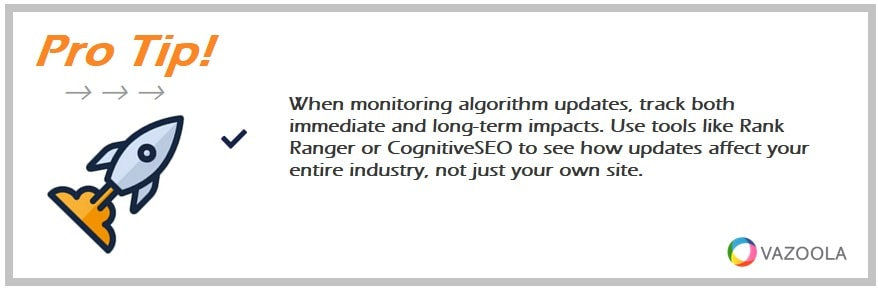
When monitoring algorithm updates, track both immediate and long-term impacts. Use tools like Rank Ranger or Cognitive SEO to see how updates affect your entire industry, not just your own site.
3 Key Factors that Cause a Google Ranking Drop Suddenly
If Google ranks your site low in the SERPs, you’re not going to get much traffic – and even fewer customers. Keeping an eye on your Google ranking, therefore, is paramount to success. The next step is understanding why your rankings may have dropped.
Everyone’s Google rank will surely change from time to time, but there are three key reasons why.
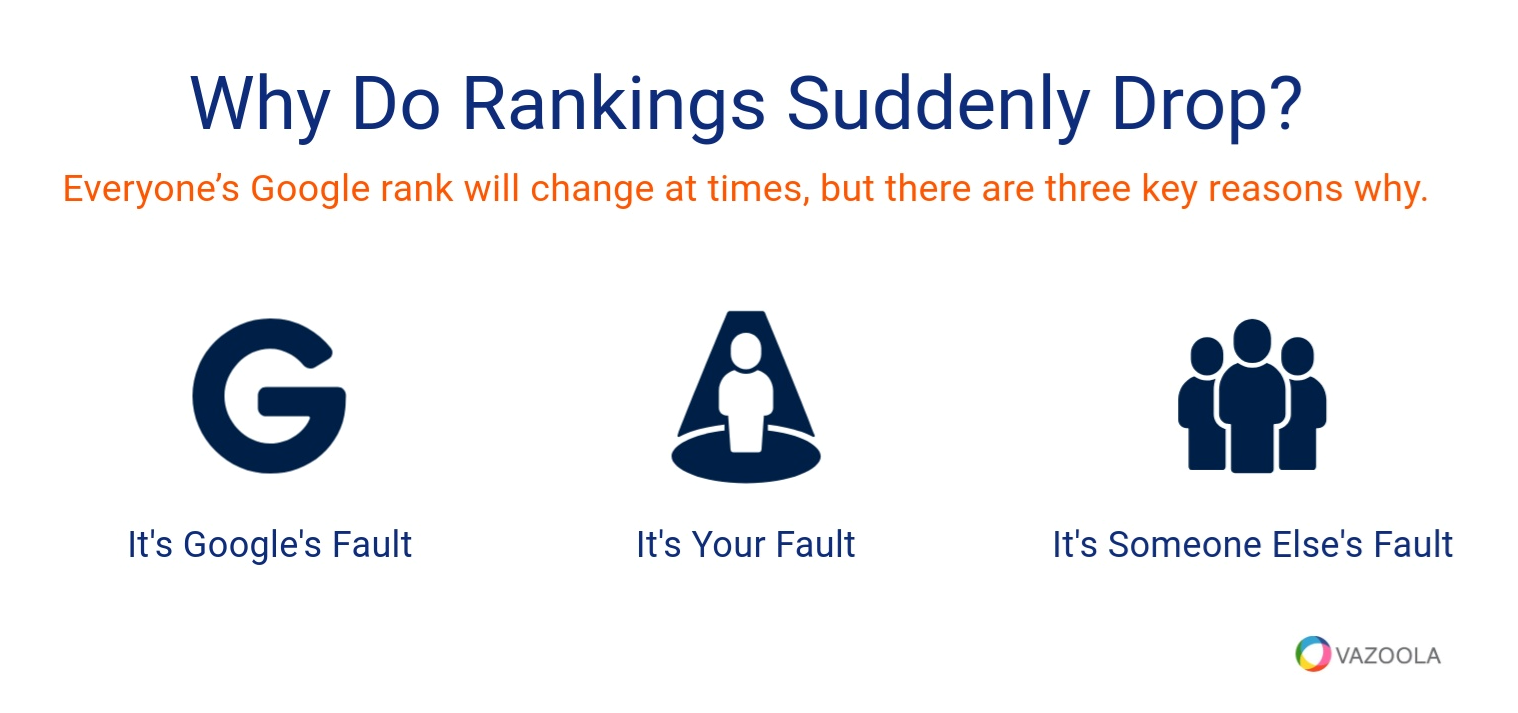
It’s Google’s Fault
Core algorithm updates are a common reason for a Google ranking change. Core updates occur multiple times a year and are designed to improve the quality of search results.
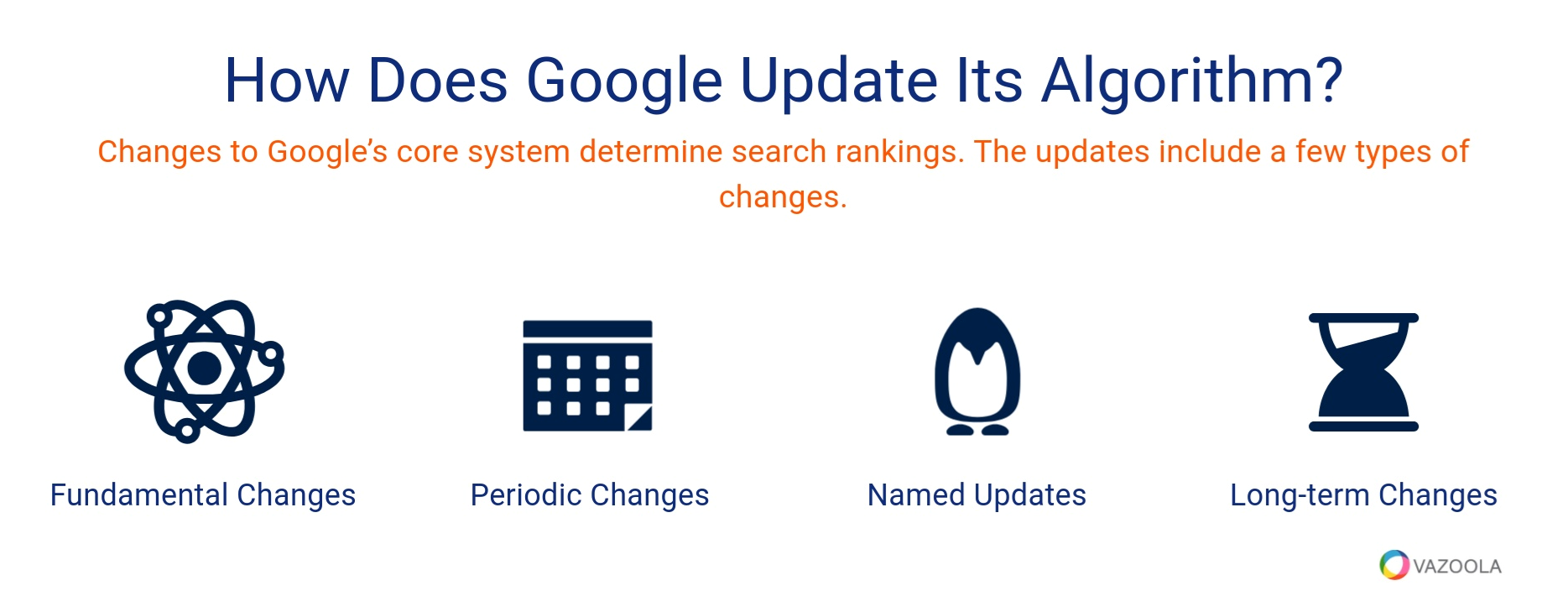
What are algorithm updates? These Google ranking changes to its core system determine search rankings. The updates include a few types of changes, including:
-
Fundamental Changes: These types of algorithm changes affect the way Google ranks websites. It affects a broad range of websites in many industries.
-
Periodic Changes: While broader changes to Google’s algorithm occur a few times a year, smaller updates are made on a more regular basis.
-
Named Updates: Major changes to Google’s algorithm are labeled with names like Penguin, Panda, Hummingbird, and RankBrain.
-
Long-term Changes: Some updates have lasting effects on search rankings and the SEO strategies that evolve from them.
Core updates can impact rankings overnight, sometimes without warning. To keep track of core updates, Google provides transparency through its blog and platforms like Google Search Central, where updates are announced and explained.
Aside from core updates, Google continuously adjusts its search engine results pages. These updates affect the way search results are displayed, not just the algorithm itself.
How do you recognize SERP updates? They might appear as visual or functional changes to Google’s SERPs. These affect SERPs’ layout, features and display elements. SERP updates can aso change the way users interact with results, or they might introduce new features like snippets or knowledge panels.
Recent changes like the removal of continuous scrolling on mobile SERPs, for example, shifted how users interact with search results. Webmasters must stay informed of these SERP updates, which occur more frequently than core updates. They can do so through Google’s Search Status Dashboard, which monitors current issues and updates in real-time.
It’s Your Fault (On-page and Website Factors)
Google isn’t always to blame for a drop in search ranking. Sometimes the issue is with your own website. You might have on-page factors at play, or you might be experiencing technical issues.
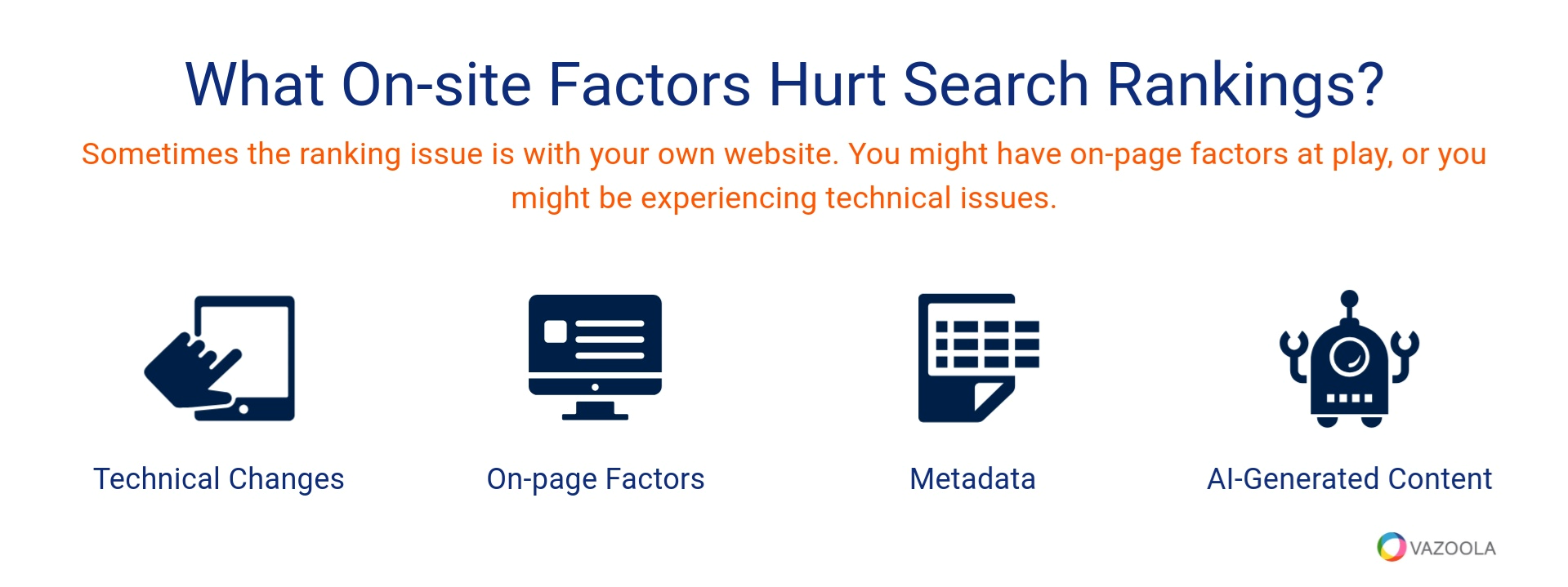
Technical Changes
When a drop in rankings is due to your site’s performance, technical changes are often the culprit. Conducting a technical SEO audit helps you identify and resolve issues like broken links, slow load times, or mobile-friendliness problems. By addressing these concerns, you ensure that your site remains optimized for search engines.
On-page Factors
On-page factors also have a direct impact on rankings. For instance, sites with thin content—pages that lack substance or provide little value—often see declines. Google's algorithm favors high-quality, informative content, so it's essential to audit your site for thin pages. Improving content depth can help recover lost rankings.
Another on-page factor that can hurt your search ranking is poor content architecture. The structure of your content should be organized in a way that makes it easy for Google to crawl. If the content architecture is disorganized, you can see a drop in search rank.
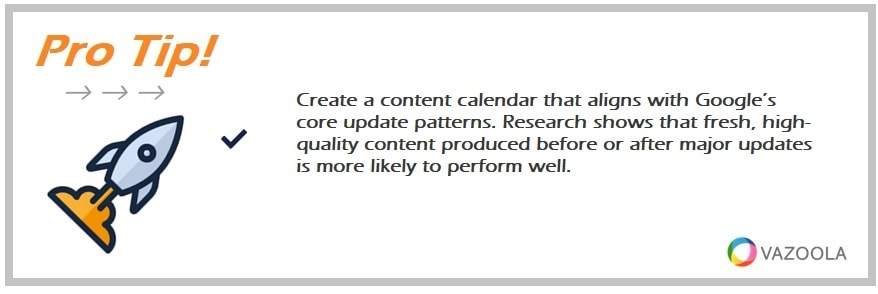
Create a content calendar that aligns with Google’s core update patterns. Research shows that fresh, high-quality content produced before or after major updates is more likely to perform well.
Metadata
Metadata plays an important role in how search engines understand and rank your pages. Elements like title tags, meta descriptions, and headers provide information that guides both search engines and users.
For example, title tags should be concise yet descriptive. They should accurately reflect the content on the page while incorporating target keywords. Titles are one of the first things Google considers when determining a page's relevance to a search query, so optimizing them is key.
Meta descriptions, though not a direct ranking factor, influence click-through rates by providing a brief summary of what users can expect from the page. Another important component of metadata is header tags. These tags (H1, H2, H3, etc.) structure your content, making it easier for both users and search engines to navigate.
Optimizing your metadata for both clarity and keyword relevance can make a significant difference in how your site performs in search rankings. If metadata is missing, irrelevant, or poorly written, it can lead to lost visibility, even if the rest of your content is strong.
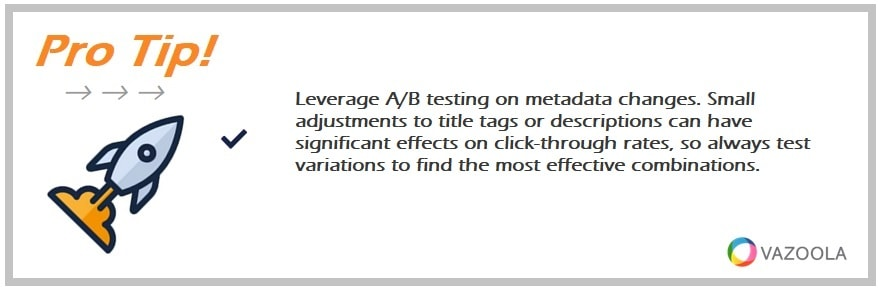
Leverage A/B testing on metadata changes. Small adjustments to title tags or descriptions can have significant effects on click-through rates, so always test variations to find the most effective combinations.
AI-generated Content
If you're using AI-generated content, it's important to understand the potential risks and benefits in terms of SEO. AI tools can help speed up content creation, allowing you to generate a large volume of material quickly.
However, Google’s algorithms are increasingly sophisticated at detecting low-quality or overly automated content. If the content lacks depth, originality, or appears repetitive, it can hurt your rankings.
While AI-generated content can serve as a helpful starting point, you should always refine and optimize it to meet quality standards. By ensuring the content provides real value, answers user queries, and aligns with search intent, you can maintain or even improve rankings. For more details on how AI content impacts SEO, explore our guide on Is AI-Generated Content Good for SEO?
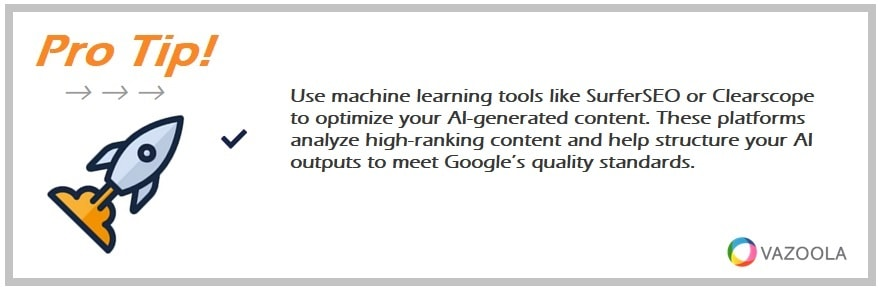
Use machine learning tools like SurferSEO or Clearscope to optimize your AI-generated content. These platforms analyze high-ranking content and help structure your AI outputs to meet Google’s quality standards.
It’s Someone Else’s Fault (Off-page Factors)
Sometimes, a drop in Google rankings can be attributed to factors beyond your control. Off-page influences, like competitor actions or shifts in your backlink profile, can significantly impact your search performance.
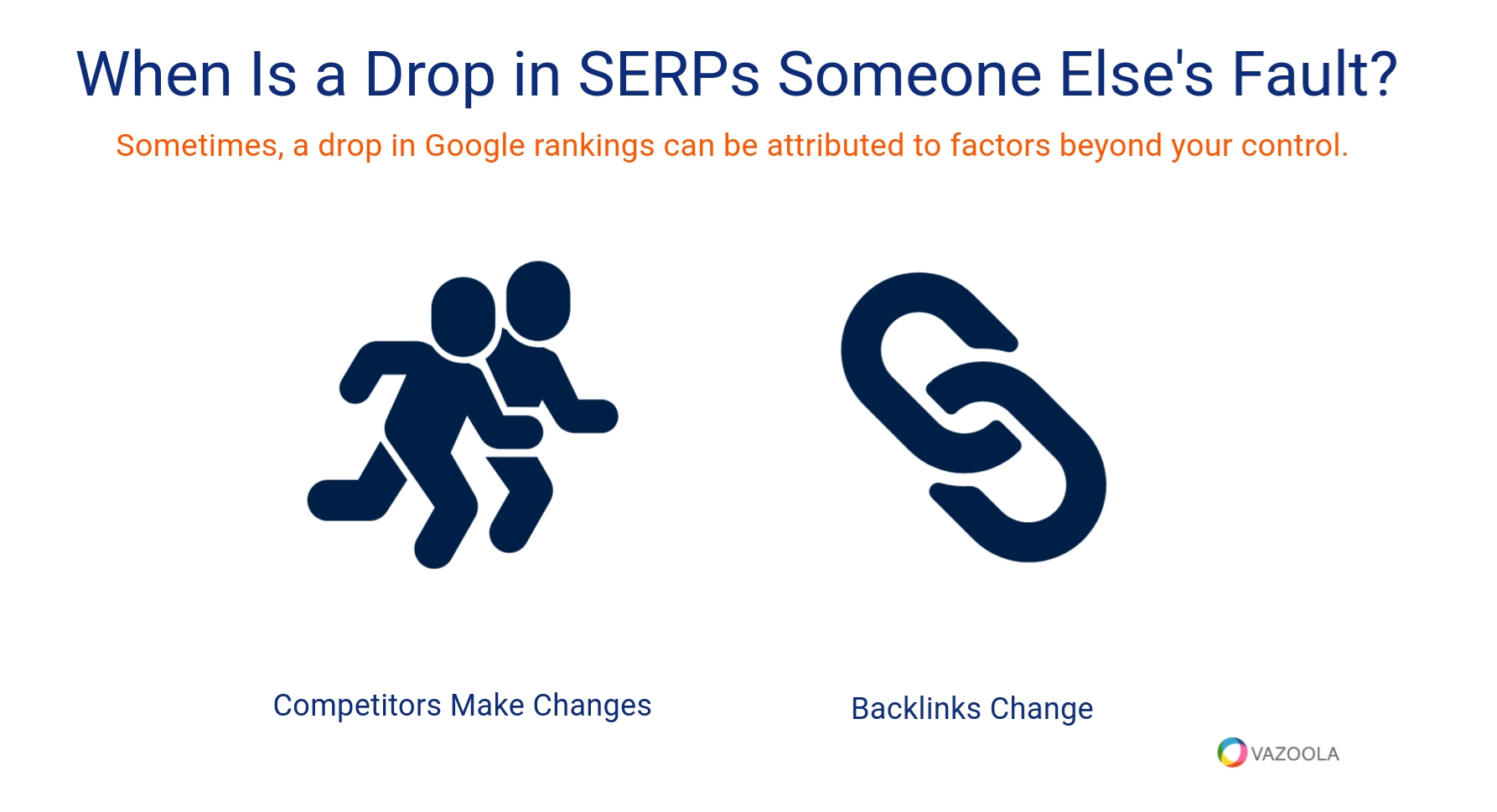
External factors are often harder to monitor, but they can have a big effect on your rankings. Stay vigilant about Google ranking fluctuations in your industry and monitor your competitors' activities to maintain your site’s visibility.
Competitors Did Something
If a competitor invests in a more robust SEO strategy – publishing fresh, optimized content, improving site performance, or engaging in targeted link-building campaigns, for example – it may result in a rankings boost for them and a drop for you.
To stay competitive, regularly analyze your competitors' SEO tactics using tools like Ahrefs or SEMrush. By keeping track of their keyword performance and content improvements, you can identify areas where you might need to strengthen your own SEO efforts.
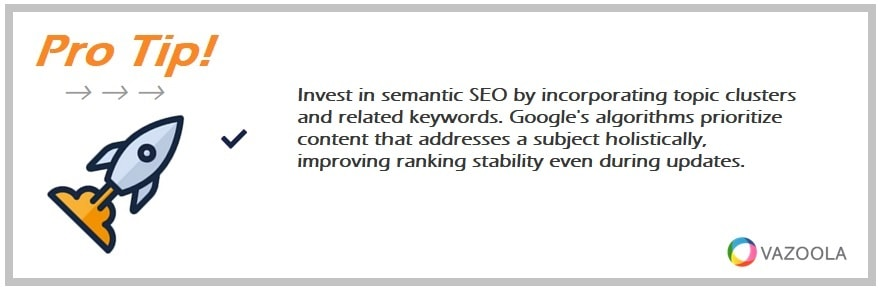
Invest in semantic SEO by incorporating topic clusters and related keywords. Google's algorithms prioritize content that addresses a subject holistically, improving ranking stability even during updates.
Backlinks
Backlinks remain a cornerstone of off-page SEO. A decline in the quality or number of backlinks pointing to your site can lead to an SEO rankings drop – as can an influx of spammy or irrelevant links.
Regularly audit your backlink profile to make sure you maintain a strong link structure. If you notice issues, disavowing harmful links and focusing on building high-quality backlinks can help restore your rankings.
Earning reputable backlinks from authoritative sites bolsters your site’s credibility and can counterbalance the effects of competitor actions or lost links. For more details, check out our guide on link building.
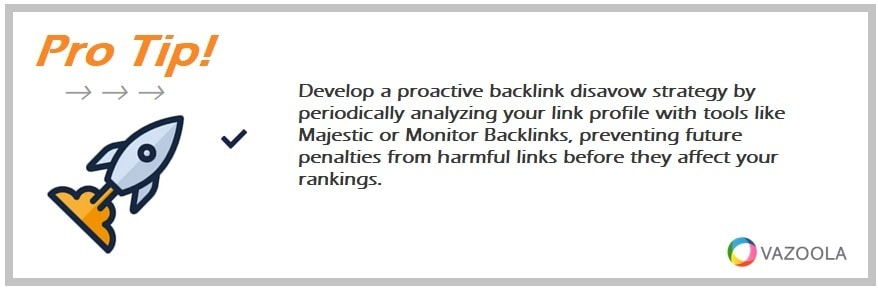
Develop a proactive backlink disavow strategy by periodically analyzing your link profile with tools like Majestic or Monitor Backlinks, preventing future penalties from harmful links before they affect your rankings.
Looking Ahead: Fixing Google SERPs
Fixing a drop in your Google SERPs can take time. Recovery depends on the severity of the drop and the steps you take to correct the issue.
Minor fluctuations might resolve within a few weeks, while more significant drops—especially those caused by algorithm updates or technical issues—can take longer. For more details on recovery time, refer to this post on Vazoola about how long it takes to see link building results.
To prevent a sudden website ranking drop in the future, make sure you follow SEO best practices. Regularly check your keyword rankings to spot trends early and address issues before they escalate. Familiarize yourself with Google Search Console and monitor it frequently. It provides critical insights into site performance, search queries, and any issues affecting your rankings.
Staying updated on Google's changes is also crucial. Follow key voices in the SEO world who regularly post about Google updates. Some valuable resources include Google for Developers and industry experts like Neil Patel.
Other good sites to follow for SEO updates include Moz, Search Engine Journal, and Ahrefs. You can also join LinkedIn groups or other online communities where professionals discuss the latest developments in search and algorithm updates.
Now do you know how to fix a Google ranking drop? Being part of the conversation keeps you ahead of potential changes that could impact your rankings.

